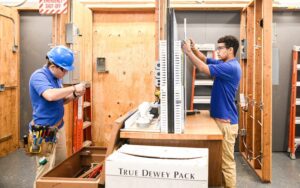
Students in the carpentry program at Passaic County Technical Institute engage in hands-on learning to prepare for career success.
At a time when many employers are struggling to fill jobs, New Jersey’s construction trade organizations are working with business leaders, vocational-technical schools, county colleges and other educational institutions and educators to ensure there’s a good fit between career and technical programs and labor needs.
“Employer involvement is key,” Jackie Burke, executive director of the New Jersey Council of County Vocational-Technical Schools (NJCCVTS), notes. “Our county vocational-technical schools maintain strong connections in industry so that career programs evolve and keep pace with changes in the workplace. Business leaders, local employers, labor unions and more all commit time, talent and resources to help prepare New Jersey’s workforce of the future.”
“A great example of our union partnering within New Jersey to meet workforce preparedness needs is our involvement with higher education,” William Sproule, executive secretary-treasurer, Eastern Atlantic States Regional Council of Carpenters, points out. “Thomas Edison State University and our Northeast Apprentice Training Funds have partnered to allow credits earned in our apprentice program to work towards an associate degree in construction management. Now, workers in New Jersey can gain a degree in management while also gaining all the real-world skills needed for our growing construction industry. Together, we are directing young people towards not just jobs, but future careers.”
“Partnerships are key to New Jersey’s economic success, because their successes, measured in efficiency, profitability and employment, contribute to the state’s coffers while helping to maintain our standard of living and bring more and more families into the middle class,” IUOE Local 825 Business Manager Greg Lalevee says. “IUOE Local 825 understands the value of laying out joint responsibilities between management and labor. The resulting working relationship fosters a sense of teamwork as well as operational benefits that enhance profitability for developers and contractors and contribute to wages and benefits.”
Over the past several years, IUOE Local 825 has forged partnerships with groups in management, government agencies and, most recently, education, including the IUOE Joint Apprenticeship and Training Committee (JATC), a partnering organization that pairs union representatives and construction contractors. Its mission is to ensure Local 825 members get the skills that are in need now and in the future.
For example, when the public utilities began programs to harden their infrastructure after Hurricane Sandy, Local 825 put a training program together that focused on utility work.
When pipelines are needed, Local 825 not only offers training, but is also one of only two places in the country offering drilling competency testing. With the current and projected need for truck drivers, the local will also offer a program for drivers to obtain their Commercial Driver’s License (CDL).
Through its apprenticeship program, LIUNA and Laborers Local 472 entered into a partnership with the City of Newark to recruit and train local residents for its lead service lines replacement program. Twenty Newark residents were brought into the program, offered the necessary training by the Laborers Union, and were dispatched to perform the infrastructure work in their own community. Though originally projected to take 8-10 years, all 23,000 lines were replaced in just 2.5 years and the 20 members are now working on other projects in New Jersey.
“The better our connections between LIUNA, educators, public officials and private-sector employers, the better our outcomes can be,” Rob Lewandowski, LIUNA, Eastern Region communications director, notes. “Partnerships allow us to define objectives, prioritize resources, and eliminate obstacles to ensure success. I liken it to a rowing crew. If everyone is not committed to the same cadence and the same direction, you’ll likely end up traveling in circles. Good partnerships may require the same work as everyone going it alone, but partnerships will take you a lot further.”
New Jersey’s county vocational-technical schools welcome the involvement of trade unions, business leaders and industry experts to partner with them in many ways, NJCCVTS Burke adds. “For example, interested parties can join a career and technical education (CTE) program advisory board, offer apprenticeships, internships and other work-based learning opportunities, host students on-site, mentor students, train CTE teachers in new technologies, hire graduates, donate equipment, or participate in students’ technical skills assessments.”
“Partnerships are the foundation of workforce development,” Local 102 President Bernie Corrigan says. “At Local 102, we provide a seamless pathway to a bachelor’s degree in construction management thanks to our partnership with Rowan University. Couple this agreement with our tuition reimbursement program and you remove many of the barriers that inhibit progress. We have similar programs with other partners in the business community. It’s all about focusing on the individual – provide an atmosphere where education is both encouraged and accessible and opportunity for all stakeholders will follow. If we want the workforce to be able to pivot in an everchanging environment we need to provide a pathway for it to do so.”
“Partnership opportunities are enormous, but will work only if we demonstrate leadership and vision,” Eastern Atlantic States Regional Council of Carpenters’ Sproule concludes. “Our Hammonton Training Center meets the needs of the growing offshore wind industry and the thousands of jobs the bipartisan infrastructure bill will bring to New Jersey. The first of its kind new heavy highway, pile driving, and offshore construction training facility at our training center will help construction workers meet these needs.
“The offshore wind industry alone will become a massive job creator for union carpenters and other trades. The New Jersey Offshore Wind Strategic Plan says that offshore wind power will create 6,000 to 8,000 jobs per year, culminating in 68,349 job years from 2020 to 2035. We look forward to expanding offshore wind power because it will require the best trained, dedicated workforce available, and union carpenters have the talent to provide it.”
Read this article by Vince Baglivo as it originally appeared May 9, 2022 in New Jersey Business.



